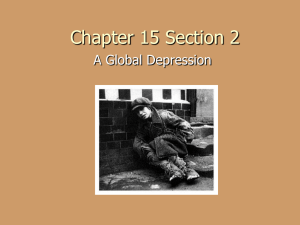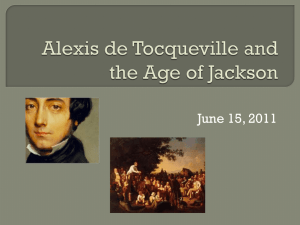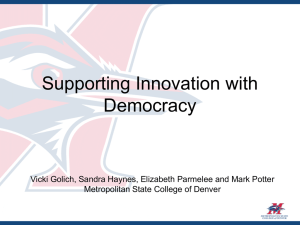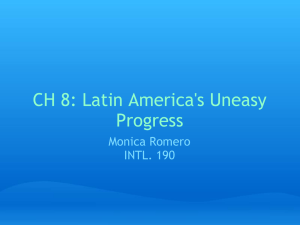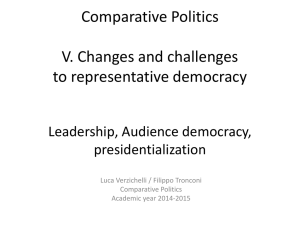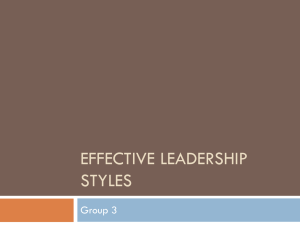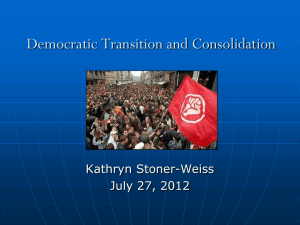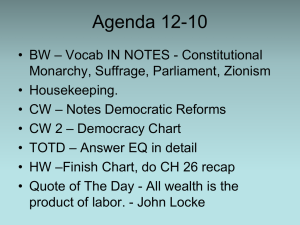Black Mountain College - University of Winchester
advertisement
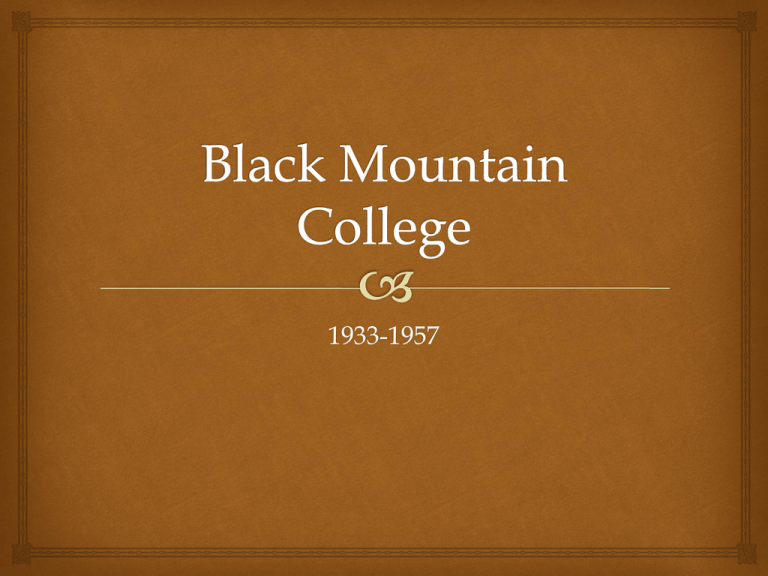
1933-1957 Introduction Black Mountain College was founded in 1933 and closed in 1957 (not ‘56!) It drew educators disaffected by other American university’s as well as exBauhaus teachers who had left Germany because of the rise of the Nazi party. It closed in 1957 due to bankruptcy. Education at Black Mountain College was not democratic but for democracy; a means to democracy rather than a democratic end in itself. The curriculum of the college was primarily focused on ethical development, therefore its rational coherence was at the mercy of these ethical demands. Academic, pedagogical and personal freedom being de rigour meant that there was no over-arching rationality for the college but rather an underpinning thought: democracy. The Thought of Democracy Rectors at Black Mountain College were focused on democracy (Rice, 1933-1940), ethics (Albers, 1941-1949), and learning method as opposed to facts (Olson, 1951-1957). The College’s intention was to teach how to be ethically responsive rather than rationally assertive; wherein lay its impossibly demanding democratic imperative. As the extremely diverse and unconventional art produced at Black Mountain College would suggest, there can be no argument that a dominant creative rationality was ever in place, but the same cannot be said for a dominant ethical ideal. The theory and practice of the educators–and particularly the rectors–at the college presents a convincing case for an approach to liberality and democracy wherein both concepts are perceived as ethical rather than rational ideals. The Thought of Democracy At Black Mountain College the ethical thought of democracy preceded, influenced, and disrupted the complementary and competing ratiocinations of the faculty and student body. However, Black Mountain in practice was not what could be called politically democratic – particularly in comparison to a learning environment like A.S. Neill’s Summerhill School in England, where all major decisions are made by a vote including both students and teachers. As Martin Duberman writes of Black Mountain College: Though students from the start had a larger formal voice in decisionmaking than was (or is) true at most colleges, they did not have an equal voice with the faculty. All that Rice ever claimed was that in at least one sense Black Mountain came as near to a democracy as possible: individual economic status had nothing to do with one’s standing in the community. Duberman, Martin, Black Mountain: An Exploration in Community, (London: Wildwood House, 1974), pg. 37. The Thought of Democracy Because a politically democratic community was not the explicit aim of the college, the thought of democracy or of a democratic education must be considered in terms other than that of the community’s political organization. However, the removal of financial inequality and, furthermore, financial motives from the college is significant in differentiating its rationality and ethicality from that of other educational establishments. Rice writes that, ‘other colleges, we knew, existed as ends in themselves. (They are, says the law, “nonprofit” organizations, but that law is a liar. They are as much run for profit, to their runners, as General Electric).’ Rice, John Andrew, I came out of the Eighteenth Century, (London: Harper and Brothers, 1942), pg. 324 The Thought of Democracy This was not the approach that Black Mountain College, which was owned by the faculty, aimed to take; instead, it would be a means to educating the ‘democratic man’. The thought of democracy would underpin its institutional organization and educational practice, but not to the extent where the college would be either a democratic or private economic end in itself. In this sense, structural distinctions are drawn between the futurity of democracy and the immanence of education, as well as more broadly between perceiving education as an inherent social good as opposed to a commodity to be sold as any other for private gain. However, this suspension of the democratic end from educational practice does not imply its removal. Neither does the reticence to consciously put the institution on the marketplace betray liberal or democratic ideals. In both cases the teleological suspension of democracy occurs as a safeguard against the rational taking over from the ethical. The educational means are thus enabled by the thought of democracy and yet do not have to justify themselves as ‘inherently’ democratic but rather as being for democracy. Ethics, Aesthetics and the Democratic Man In his autobiography of 1942, I Came Out of the Eighteenth Century (an affectionate reference to the charming backwardness of his native South Carolina), Rice explains the reasons for the central curricular design of Black Mountain College’s founders: The center of the curriculum, we said, would be art. The democratic man, we said, must be an artist. The integrity, we said, of the democratic man was the integrity of the artist, an integrity of relationship…the artist, we said was not a competitor. He competed only with himself. His struggle was inside, not against his fellows, but against his own ignorance and clumsiness…Also just as the artist would not paint his picture with muddy colors, so this artist must see clear colors in humanity; and must himself be clear color, for he too was his fellow artist’s color, sound, form, the material of his art. But, different from pigment, bow, granite, not used up in the use; rather, made more of what he would be, a note within the symphony, the clearer for having been written; giving up, and asked to give up, nothing of himself. That was the integrity of the artist as artist. That should be the integrity of man as man. Rice, John Andrew, I came out of the Eighteenth Century, (London: Harper and Brothers, 1942), pg. 328-329. Josef Albers Ethics, Aesthetics and the Democratic Man The relationship among ethics, aesthetics, and democracy was to become a mainstay of philosophically educational thinking at the college. This development of non-competitive relationships marks this democratic ethic, a conception of education devoid of the competitive pursuit of private economic interest. To educate the democratic man was not to provide him with the means to be able assert his own democratically endowed self-interest, nor was it to teach advocacy of one political system over another. Instead, it was the teaching of a democratic method Music and Dance at BMC http://www.youtube.com/watch?v=ra2T_iMXQV M http://youtu.be/pUTXNxFvjDw Ethics, Aesthetics and the Democratic Man Rice engages with art in this outlining of the curriculum: Firstly as an educational tool for the democratic citizen; secondly as a painterly metaphor for the democratic citizen’s subjective engagement with the world; thirdly as a metaphor indicative of the democratic citizen’s responsibility to society. Through an art education citizens would come to realize the part they play in the world, a part they also play for others. The ethical and aesthetic roles democratic human beings play are not concerned with the fixing of identities but the development of responsiveness. Such a method of responsiveness is not an end in itself but the means to a suspended democratic end. Architecture and Engineering at BMC http://youtu.be/jgfrvZ-SxPQ http://youtu.be/JMB-eChfrNY The Paradox of Democratic Communitas In his autobiography Rice argues, perhaps with a somewhat veiled reference to Albers (amongst others), that most artists are not in love with art but “in love with themselves(,)” and he therefore finds it easy to understand how some psychologists call art a neurosis.”(Rice, 1942: 326) This recasting of the potential for the artist to be a negative role model rather than a shining example of the democratic man is particularly dangerous in the kind of intimately connected educational community that he describes Black Mountain College as being. He states that while the college was new in many senses it was in fact to be of “the oldest kind, a communitas” (Rice, 1942: 320) and that while: In other places education was part of the day and part of the man; in Black Mountain it was round the clock and all of the man. There was no escape. Three meals together, passing in the hall, meeting in classes, meeting everywhere, a man taught by the way he walked, by the sound of his voice, by every movement. That was what it was intended to be, the fulfillment of an old idea, the education of the whole man: by a whole man. (Rice, 1942: 323) Poetry at BMC http://youtu.be/gAYxpSjkyAg (Charles Olson) The Paradox of Democratic Communitas As such the pressure on the artist and educator to be the whole and ideal democratic human person in the context of Black Mountain College was increased dramatically. The demand on the democratic ethicality of the faculty was also tested by a kind of extra-institutional “pure democracy” which meant that a general deferral to individual ethical application of intelligence over law could frequently cause problems. Rice writes, “I learned for one thing, the need of law, an abstract, intellectual, bridle to hold passion when intelligence fails. Black Mountain was a pure democracy.” (Rice, 1942: 324) The Paradox of Democratic Communitas However, in following with the necessary suspension of democracy, there can be no such thing as a “here and now” of democracy; it inspires the means, but it is not the means. To preserve the primacy and social demands implied by democratic ethics, it becomes necessary to accept that any “means” can only ever fall short of being democratic. The “pure democracy” that Rice refers to might therefore be an impossible attempt to free democratic thought and make it immanent rather than keep it as what might be determined “quasi-transcendental.” That is to say, “idealizing” the present to the extent where it becomes difficult to determine whether the college could any longer consider itself as a means to democracy and not an end in and of itself. The Paradox of Democratic Communitas The tensions brought about by this confusion of purpose, which in another academic environment might have born fruit for a longer period of time, burned out and forced first Rice then Albers to leave the college. The unwillingness or inability to more clearly differentiate between the means and ends of the college was perhaps largely due to the college and the community being one and the same. This was particularly problematic because of the underlying implication that the college should live up to its ideals in the community. While this may seem an entirely rational as well as ethical approach to take, it fell foul to the paradox formed by the need to legitimate an ethical primacy which transcends legitimation.

